PR
X
Keyword Search
▼キーワード検索
Comments
私はイスラム教徒です@ Re:アイルランド・ロンドンへの旅(その108): ロンドン散策記・ビートルズ ロンドン ウォーキング ツアー-2(10/14)
神神は言った: コーランで 『 (21) 人…
私はイスラム教徒です@ Re:アイルランド・ロンドンへの旅(その81):Dublin市内散策(19/)・St Patrick's Cathedral・聖パトリック大聖堂-1(09/17)
神神は言った: コーランで 『 (21) 人…
私はイスラム教徒です@ Re:アイルランド・ロンドンへの旅(その65):Dublin市内散策(4/)・Custom House Quay(カスタム・ハウス・キー)~EPIC The Irish Emigration Museum(EPIC アイルランド移民博物館)-1(09/01)
神神は言った: コーランで 『 人びとよ…
私はイスラム教徒です@ Re:アイルランド・ロンドンへの旅(その66):Dublin市内散策(5/)・EPIC The Irish Emigration Museum(EPIC アイルランド移民博物館)-2(09/02)
神神は言った: コーランで 『 人びとよ…
2025年5月 花のカナ…
 New!
隠居人はせじぃさん
New!
隠居人はせじぃさん
南足柄市の寺社史蹟… New! オジン0523さん
【ヒヨドリジョウゴ … New!
Gママさん
New!
Gママさん
タイヤ交換 noahnoahnoahさん
noahnoahnoahさん
エコハウスにようこそ ecologicianさん
 New!
隠居人はせじぃさん
New!
隠居人はせじぃさん南足柄市の寺社史蹟… New! オジン0523さん
【ヒヨドリジョウゴ …
 New!
Gママさん
New!
Gママさんタイヤ交換
 noahnoahnoahさん
noahnoahnoahさんエコハウスにようこそ ecologicianさん
Calendar
カテゴリ: 海外旅行
工場で作業する女性たち
の歴史的映像。
彼女たちはおそらく第二次世界大戦期または戦後の産業労働者であり、細かい部品の組み立て
作業を行っているようであった。
アイルランドから海外に移住した人々(特に女性)が、現地で工場や技術職などに従事した
歴史を紹介しているのであった。特に第二次世界大戦中・戦後のイギリスなどでは、
アイルランド系女性の労働力は重要視 されていたのだ と。
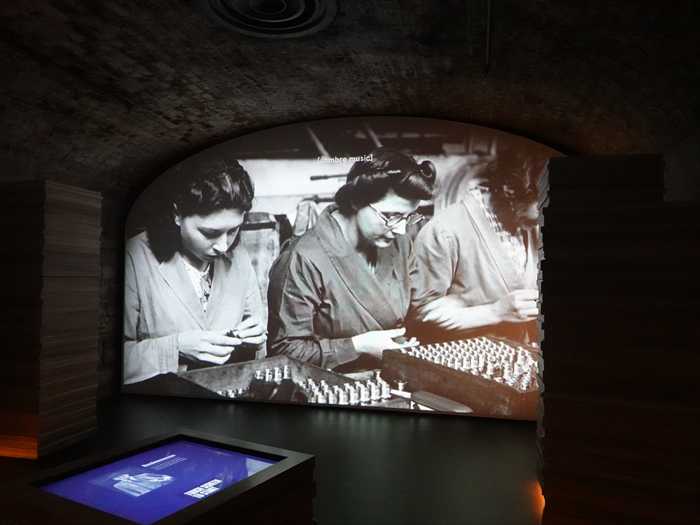
看護師 の制服を着た3人の女性。
アイルランド出身の女性が海外で看護師や医療従事者として活躍した歴史を紹介している
のであった。
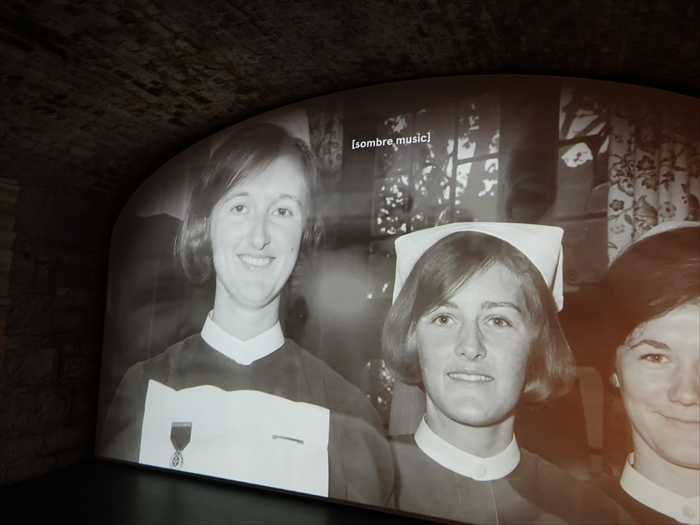
their heart gives a sigh They do kiss their Mothers and then they do say
“Fare thee well, dearest Father, we must now go away.“」
【旅立ちの前夜、彼らは別れの挨拶を交わし、翌朝早く、胸が痛む。
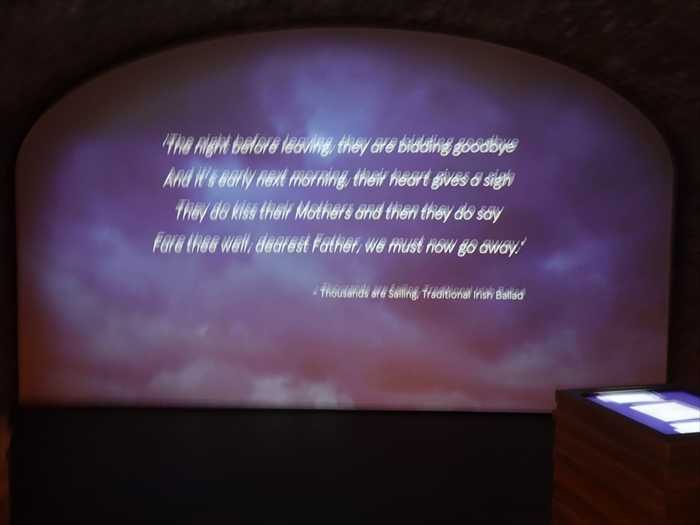
1200年代〜1700年代にかけてのアイルランド史の暗黒期を紹介。
「1200s–1700s
【1200年〜1700年頃
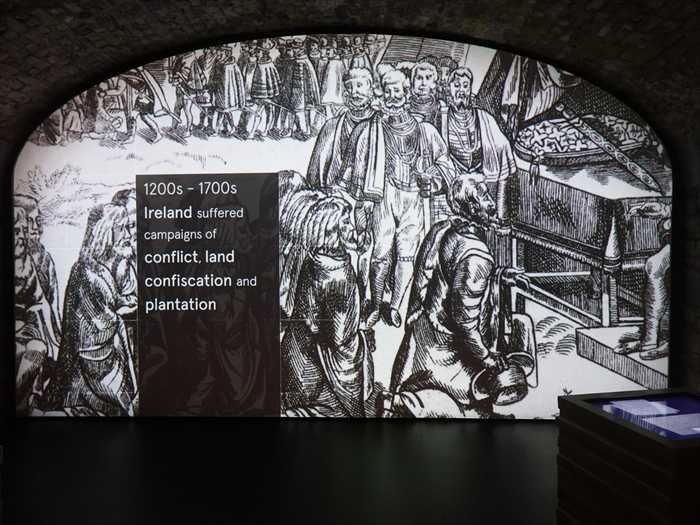
アイルランド系移民者は軍事・平和維持活動に関与した と。
映し出されているのは、 軍服を着た若者の胸像(ブロンズ像)
関わった アイルランド人兵士の記念像 であろう。
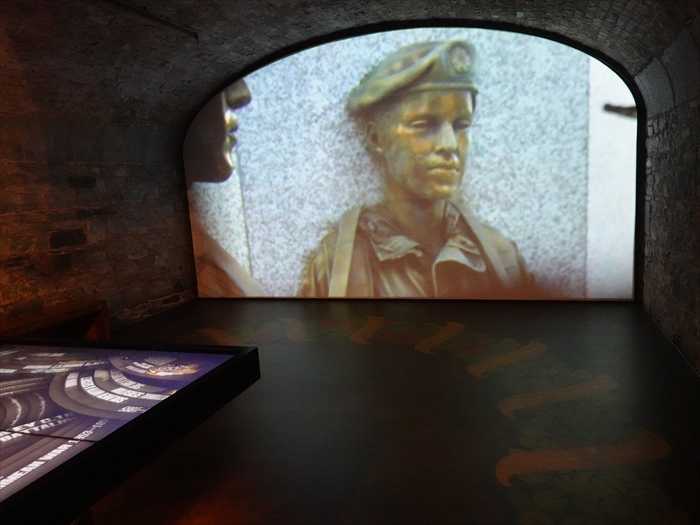
アイルランド大飢饉(Great Famine, 1845–1852) を象徴的に表現していた。
彼女たちはおそらく第二次世界大戦期または戦後の産業労働者であり、細かい部品の組み立て
作業を行っているようであった。
アイルランドから海外に移住した人々(特に女性)が、現地で工場や技術職などに従事した
歴史を紹介しているのであった。特に第二次世界大戦中・戦後のイギリスなどでは、
アイルランド系女性の労働力は重要視 されていたのだ と。

看護師 の制服を着た3人の女性。
アイルランド出身の女性が海外で看護師や医療従事者として活躍した歴史を紹介している
のであった。

their heart gives a sigh They do kiss their Mothers and then they do say
“Fare thee well, dearest Father, we must now go away.“」
【旅立ちの前夜、彼らは別れの挨拶を交わし、翌朝早く、胸が痛む。
母に口づけをし、そしてこう言うのです。
“さようなら、最愛のお父さん。私たちは行かねばなりません“】
1200年代〜1700年代にかけてのアイルランド史の暗黒期を紹介。
「1200s–1700s
Ireland suffered campaigns of
conflict, land confiscation and plantation」【1200年〜1700年頃
アイルランドは、
紛争、土地の没収、そして植民
という一連の攻撃的な政策に苦しめられた。】この展示は、アイルランドがイングランド王国によって侵略・支配された時代を示している と。
・ conflict(紛争):
12世紀後半から始まるイングランドの侵攻(ノルマン人の到来)に始まり、アイルランド
各地で反乱や内戦が頻発しました。
各地で反乱や内戦が頻発しました。
・ land confiscation(土地没収):
特に16〜17世紀の九年戦争(1594–1603)やアイルランド連邦戦争(1641–1653)の後、
反乱に関与したアイルランド人の土地が没収された。
反乱に関与したアイルランド人の土地が没収された。
・plantation(プランテーション):
没収された土地には、イングランドやスコットランドからのプロテスタント移民が送り込まれ、
先住のカトリック系アイルランド人を排除して「植民」する政策が進められた。
先住のカトリック系アイルランド人を排除して「植民」する政策が進められた。
→ これを Plantation of Ulster(アルスター植民)
などと呼ぶ と。
この時代は、アイルランド人にとって文化的・社会的抑圧の時代であり、後の
大量移民(ディアスポラ)につながる重要な歴史的契機 なのであった と。
この時代は、アイルランド人にとって文化的・社会的抑圧の時代であり、後の
大量移民(ディアスポラ)につながる重要な歴史的契機 なのであった と。

アイルランド系移民者は軍事・平和維持活動に関与した と。
映し出されているのは、 軍服を着た若者の胸像(ブロンズ像)
関わった アイルランド人兵士の記念像 であろう。

アイルランド大飢饉(Great Famine, 1845–1852) を象徴的に表現していた。
雪または霜に覆われた荒れた畑で、一人の人物が地面を掘るこの光景は、 飢餓によって
荒廃した農地や、収穫の望みが絶たれたジャガイモ畑を暗示 しているのであった。
荒廃した農地や、収穫の望みが絶たれたジャガイモ畑を暗示 しているのであった。
アイルランド大飢饉では ジャガイモ疫病(ポテト・ブライト)によって主食が壊滅
。
約100万人が餓死
し、さらに 100万人以上が海外(アメリカ、カナダ、オーストラリアなど)へ
移民。イギリス政府の不十分な対応や土地政策が、多くの死者と社会的崩壊を招いた と。
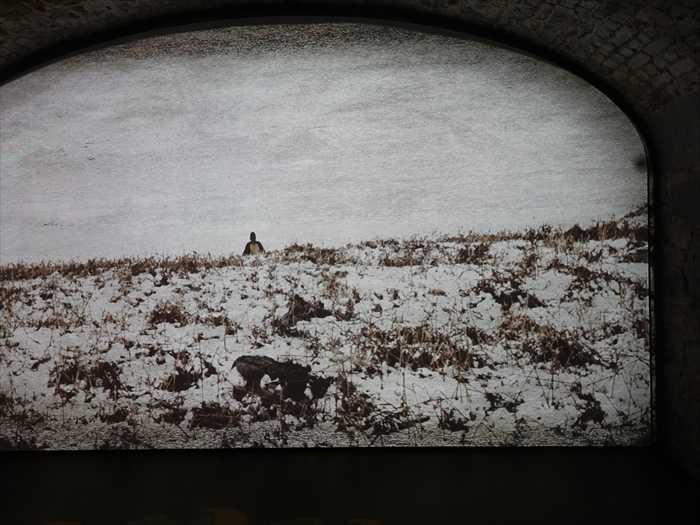
パトリック・サーズフィールド(Patrick Sarsfield) 。
移民。イギリス政府の不十分な対応や土地政策が、多くの死者と社会的崩壊を招いた と。

パトリック・サーズフィールド(Patrick Sarsfield) 。
Patrick Sarsfield(1655年頃 – 1693年)はアイルランドの軍人で、ウィリアマイト戦争
(1689–1691)中にジャコバイト側で戦いました。
(1689–1691)中にジャコバイト側で戦いました。
1691年のリメリック包囲戦後、「ワイルド・ギースの飛翔(Flight of the Wild Geese)」と
呼ばれる多くのアイルランド兵士のフランス亡命を主導。
呼ばれる多くのアイルランド兵士のフランス亡命を主導。
その後、フランス軍に仕え、オランダとの戦闘中に戦死 と。
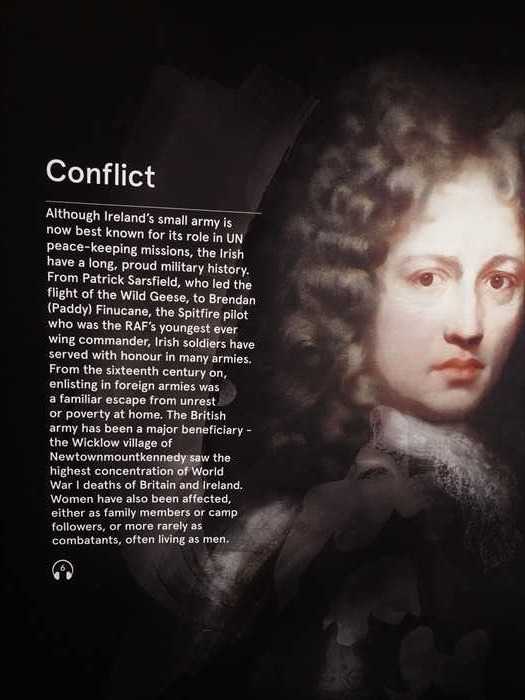
「Conflict
Although Ireland's small army is now best known for its role in UN peace-keeping
missions, the Irish have a long, proud military history. From Patrick Sarsfield,
who led the flight of the Wild Geese, to Brendan (Paddy) Finucane, the Spitfire pilot
who was the RAF's youngest ever wing commander, Irish soldiers have served
with honour in many armies.
From the sixteenth century on, enlisting in foreign armies was a familiar escape from
unrest or poverty at home. The British army has been a major beneficiary
– the Wicklow village of Newtownmountkennedy saw the highest concentration of
World War I deaths of Britain and Ireland. Women have also been affected, either as
family members or camp followers, or more rarely as combatants, often living as men.」
【 紛争

「Conflict
Although Ireland's small army is now best known for its role in UN peace-keeping
missions, the Irish have a long, proud military history. From Patrick Sarsfield,
who led the flight of the Wild Geese, to Brendan (Paddy) Finucane, the Spitfire pilot
who was the RAF's youngest ever wing commander, Irish soldiers have served
with honour in many armies.
From the sixteenth century on, enlisting in foreign armies was a familiar escape from
unrest or poverty at home. The British army has been a major beneficiary
– the Wicklow village of Newtownmountkennedy saw the highest concentration of
World War I deaths of Britain and Ireland. Women have also been affected, either as
family members or camp followers, or more rarely as combatants, often living as men.」
【 紛争
アイルランドの小規模な軍隊は、現在では国連の平和維持活動での役割で最も知られていますが、
アイルランド人には長く誇り高い軍事の歴史があります。
アイルランド人には長く誇り高い軍事の歴史があります。
「ワイルド・ギース(野生の雁)」の脱出を導いた パトリック・サーズフィールド
から、
スピットファイアのパイロットであり、英国空軍(RAF)最年少の航空団司令官となった
ブレンダン(パディ)・フィニュカンに至るまで、アイルランド人兵士たちは多くの軍で
名誉ある任務を果たして来ました。
スピットファイアのパイロットであり、英国空軍(RAF)最年少の航空団司令官となった
ブレンダン(パディ)・フィニュカンに至るまで、アイルランド人兵士たちは多くの軍で
名誉ある任務を果たして来ました。
16世紀以降、外国軍への入隊は、国内の不安や貧困から逃れる手段として一般的でした。
イギリス軍はその最大の受益者であり、ウィックロー県のニュートンマウントケネディ村は、
イギリスとアイルランド全体で最も多くの第一次世界大戦戦死者を出した村です。
イギリス軍はその最大の受益者であり、ウィックロー県のニュートンマウントケネディ村は、
イギリスとアイルランド全体で最も多くの第一次世界大戦戦死者を出した村です。
女性もまた影響を受け、家族の一員や兵士の随行者として、あるいは稀ではありますが
男装して戦闘員として参加する者もいました。】
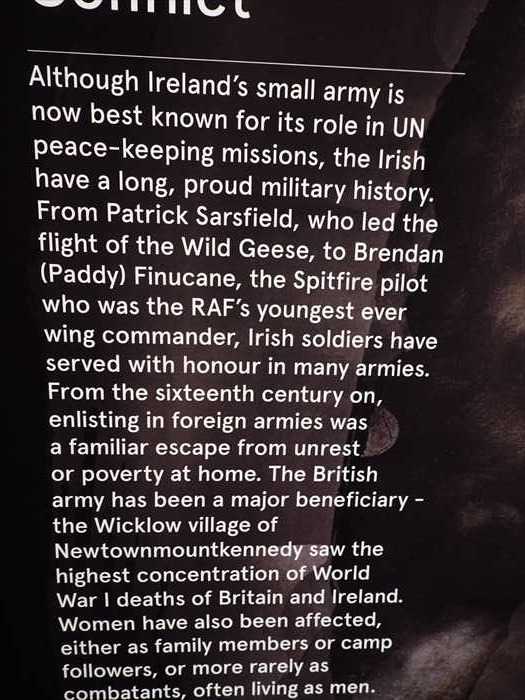
アイルランドにおけるカトリックへの抑圧政策を示すもの。
画面には次のような内容が映し出されていたのであった。
「 A series of laws aimed to force Catholics to:
男装して戦闘員として参加する者もいました。】

アイルランドにおけるカトリックへの抑圧政策を示すもの。
画面には次のような内容が映し出されていたのであった。
「 A series of laws aimed to force Catholics to:
Swear an oath to Elizabeth I of England as supreme spiritual governor
1559 Act of Supremacy
Suffer death, imprisonment, transportation, or … The 1641 Rebellion Acts
」
【 カトリック教徒に強制するための一連の法律:
【 カトリック教徒に強制するための一連の法律:
・イングランド女王エリザベス1世を「最高宗教統治者」として誓うことを強要
・1559年 至上権法(Act of Supremacy)
・死刑、投獄、流刑、または……1641年反乱関連法に基づく刑罰に苦しむこと】
背景
背景
・ 1559年 至上権法(Act of Supremacy)
エリザベス1世が制定した法律で、イングランド国教会の最高統治者(Supreme Governor)
として君主の権威を明記。これにより、 ローマ教皇の権威を否認しない者は反逆者 とされた。
として君主の権威を明記。これにより、 ローマ教皇の権威を否認しない者は反逆者 とされた。
・1641年反乱(Irish Rebellion of 1641)
アイルランドのカトリックがイングランド統治に対して起こした大規模反乱。これにより
プロテスタントとの対立がさらに激化し、後のクロムウェルのアイルランド征服 へとつながる。
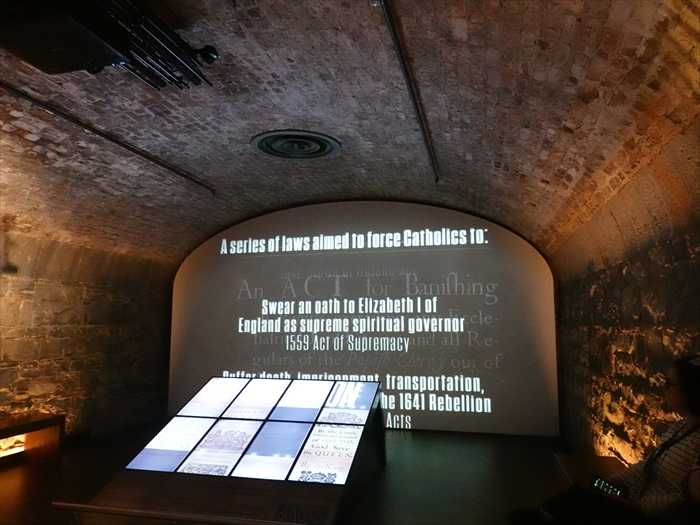
1652年の土地再分配法(Act of Settlement 1652)およびクロムウェルのアイルランド侵攻に
おけるカトリック聖職者の迫害を伝えるもの。
「UNDER THE ACT OF SETTLEMENT 1652 CATHOLIC CLERGY COULD BE EXECUTED IF CAPTURED.
追跡されたカトリック聖職者の一人でした。】
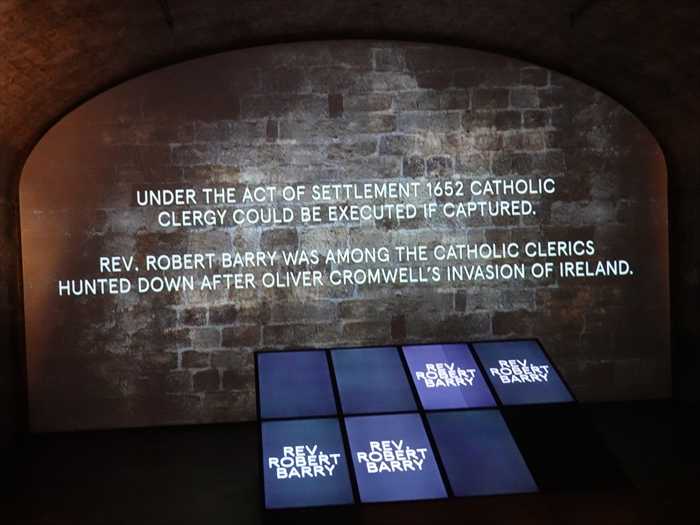
イングランド側(特にクロムウェル派や議会派)の視点を再現したナレーションか登場人物の
セリフであり、1641年のアイルランド反乱(Irish Rebellion of 1641)を指していると
考えられる。
「since their murderous rebellion was put down・・・・」
【彼らの殺人的な反乱が鎮圧されて以来。・・・・】
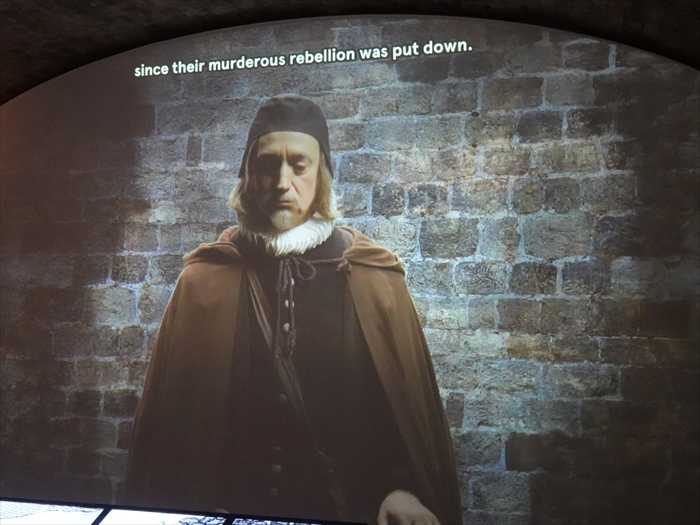
It is also a powerful story of contribution and adaptation.」
【結局のところ、移民の歴史は悲しみと後悔の記録だけではありません。
それはまた、貢献と適応の力強い物語でもあるのです。】
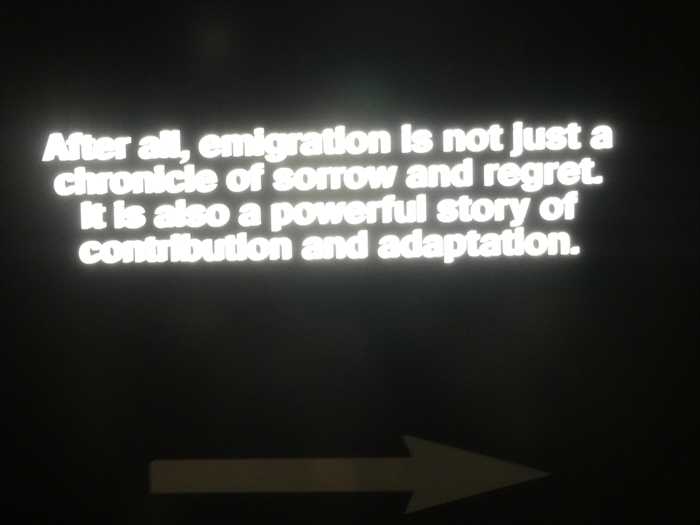
地下の展示通路の一部であっただろうか?
石造アーチ天井:アーチ型の石造の天井と壁は、19世紀の倉庫(CHQ Building)を再利用した
EPICミュージアムの特徴である と。
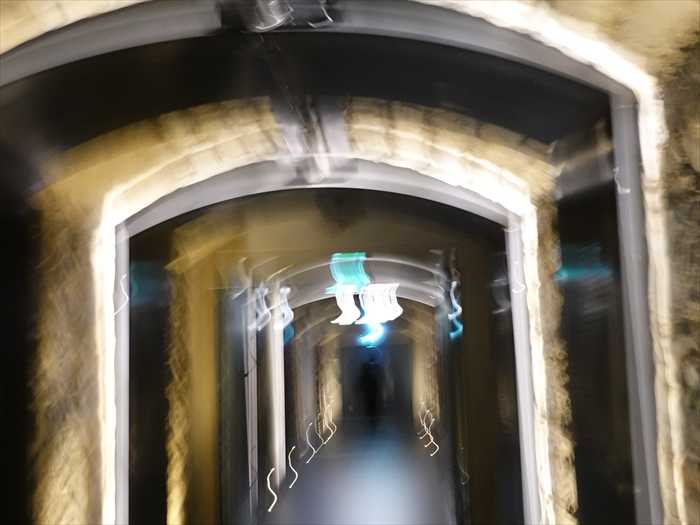
1995年にアイルランドの詩人シェイマス・ヒーニー(Seamus Heaney)がノーベル文学賞を
受賞したことを記念したもの。
「1995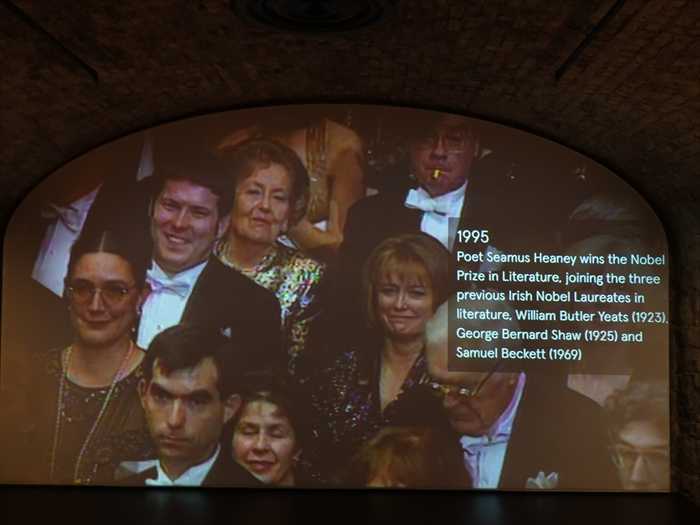
アイルランド系移民のスポーツ分野での功績や文化的影響を紹介する一場面 。
「WHAT A PLAY · NOW TAKING THE LEAD · HERE COMES JOHNNY」
【なんというプレーだ! いまリードを奪った! ジョニーが来たぞ!】
「スポーツと移民の功績」セクションの一部であっただろうか?
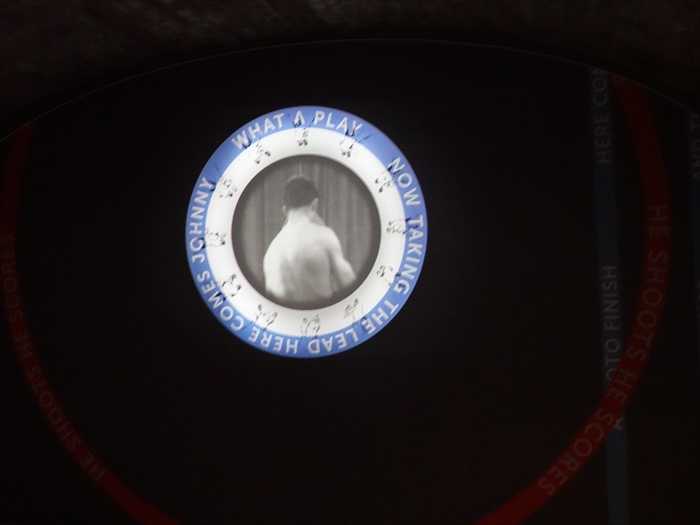
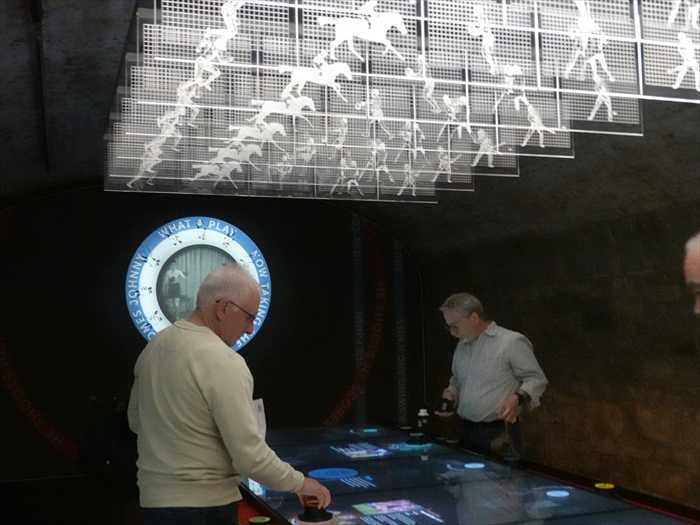
「スポーツと移民」セクションの一部 で、プロジェクション映像とインタラクティブアートが
組み合わさった展示空間。
画面全体は緑と黒のモザイク状のグリッドで覆われており、中央が徐々に透明化
(ピクセルが消えていくように)され、背景にラグビーかゲーリックフットボールの
映像が現れて来たのであった。
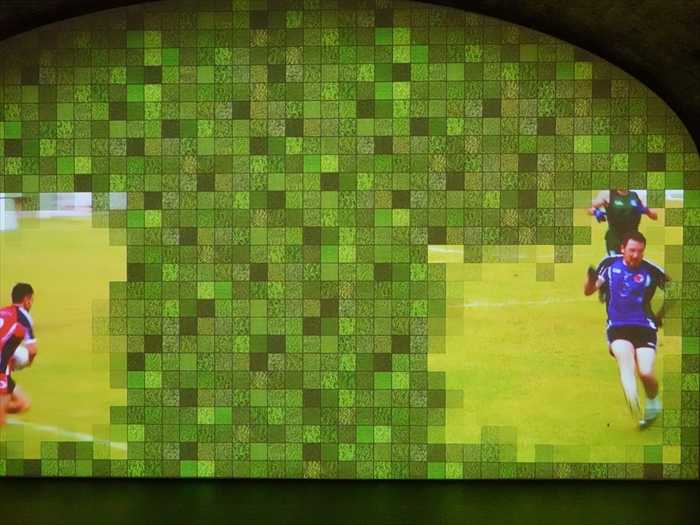
アイルランドのスポーツ文化と移民のつながりを象徴するセクション。
左:青いジャージ(Aerolineas Argentinas)
アルゼンチンのアイルランド系ゲーリック・フットボールチーム
ロゴ:「Aerolineas Argentinas(アルゼンチン航空)」とあり、アイルランド系移民が
南米で設立したクラブチーム?
中央:白とオレンジのバスケットボール型ユニフォーム
ゲーリックバスケット(国際的展開の一環)、またはアメリカのアイルランド系クラブの可能性。
右:赤と黄のジャージ(サイン入り)
ベルギーやスペインにあるアイルランド系クラブのチーム?
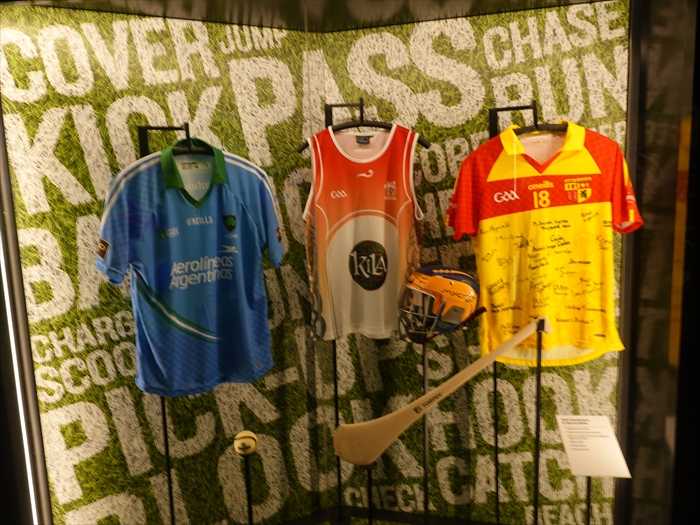
世界中のアイルランド系移民がゲーリック・アスレチック協会(GAA)のスポーツ を通じて
繋がっていることを示している。
ゲーリック・フットボール 👈️リンクは1チーム15人のプレーヤーによって行われ、長方形の
競技場には両側にH型のゴールがある、アイルランドで最も人気のあるスポーツである。
サッカーとバスケットボールの技術を要するスピーディーなゲームである。
左:黒・緑・赤・白のユニフォーム
国旗モチーフのデザイン(南アフリカ共和国の国旗に類似)
南アフリカにあるGAAクラブ
中央(白黒のユニフォーム)
イギリス国内のアイルランド系クラブ
右(黄・緑・黒のユニフォーム)
アメリカのGAAクラブ
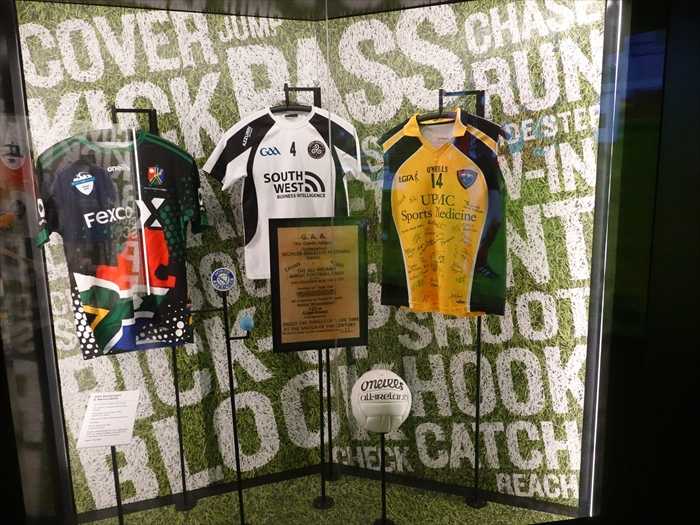
アイルランド系移民が世界各地でゲーリックスポーツを実践 していることを象徴する
ユニフォームやスポーツ用品が並べられていた。
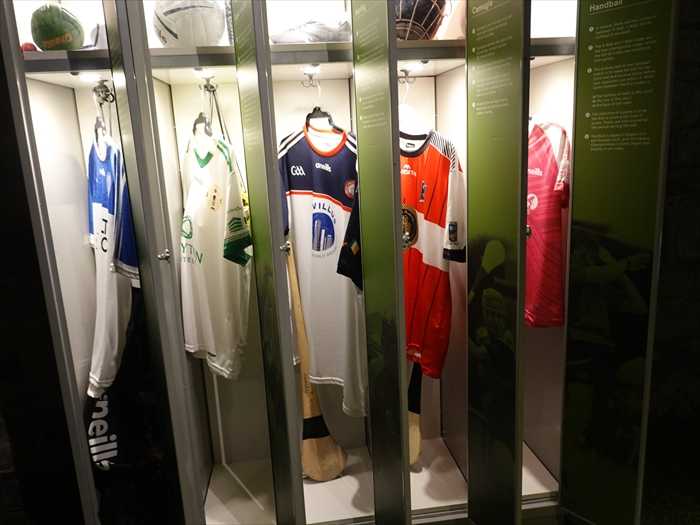
「 GAA Equipment & Memorabilia
【 GAAの用具と記念品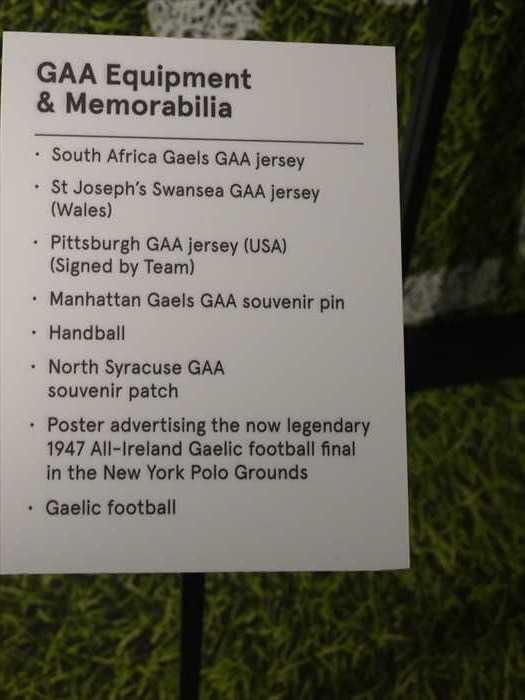
ハーリング(Hurling) 👈️リンク の国際的な広がりを紹介する展示.
「Hurling matches were played weekly until World War I stopped the import of hurleys」
【第一次世界大戦がハーリー(ハーリング用のスティック)の輸入を止めるまで、ハーリングの
試合は毎週行われていた。】
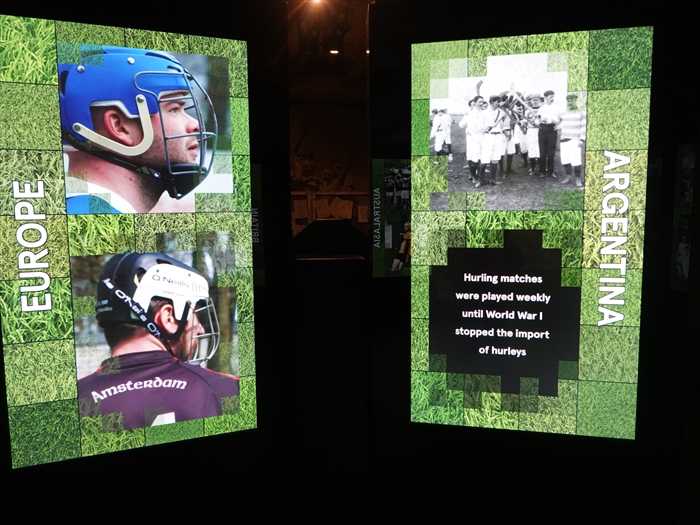
これも ハーリング(Hurling)展示コーナー の一部。
ユニフォーム姿の男性たちが笑顔で手を振っている、古い時代のチーム集合写真
(おそらく20世紀前半)。
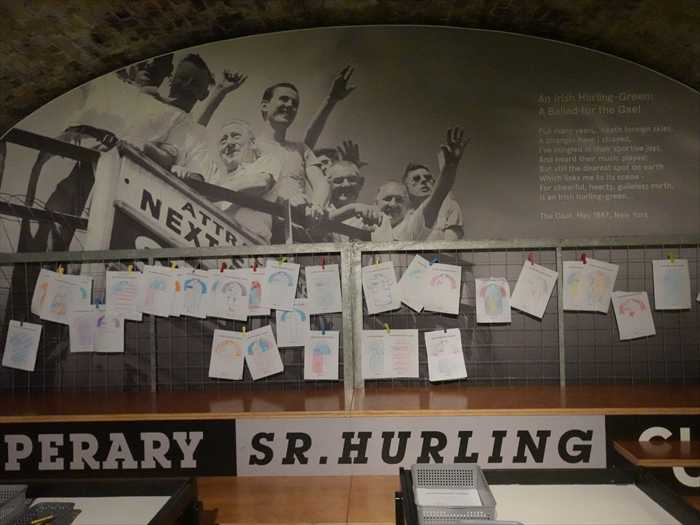
「 Playing the World
have historically been played in other countries by Irish-born immigrants, this has
started to change in recent years. Players and even whole teams with little or
no Irish connection are playing outside Ireland, as Gaelic games prove their worth
even without the cultural history.」
【 世界でプレイされるゲーリック・ゲーム
生まれの移民によって他国でも行われてきましたが、近年では状況が変わりつつあります。
アイルランドにほとんど、あるいはまったく縁のない選手やチームがアイルランド国外で競技に
参加しており、文化的な背景がなくてもゲーリック・ゲームの価値が証明されているのです。】
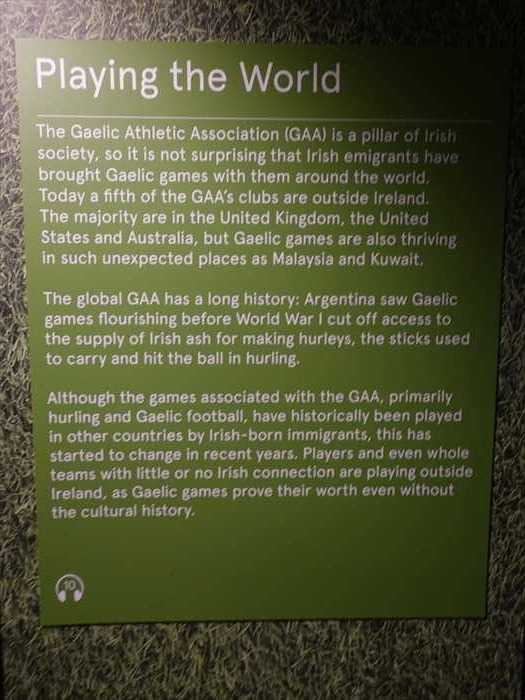
ゲーリック・ゲームの世界的な広がりを象徴するインスタレーション作品 。
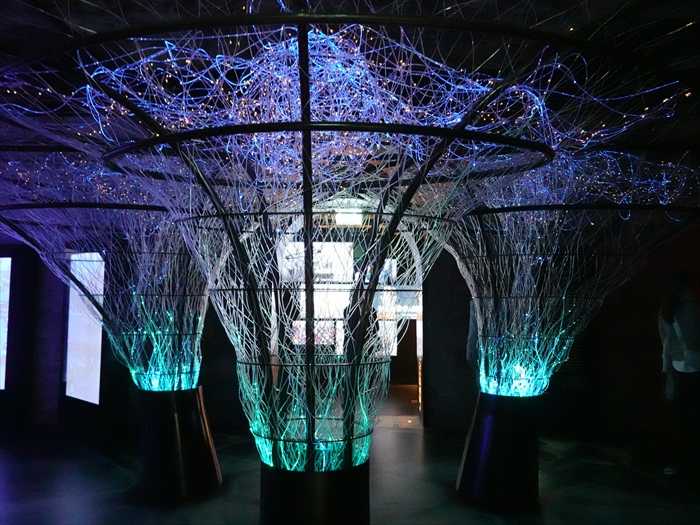
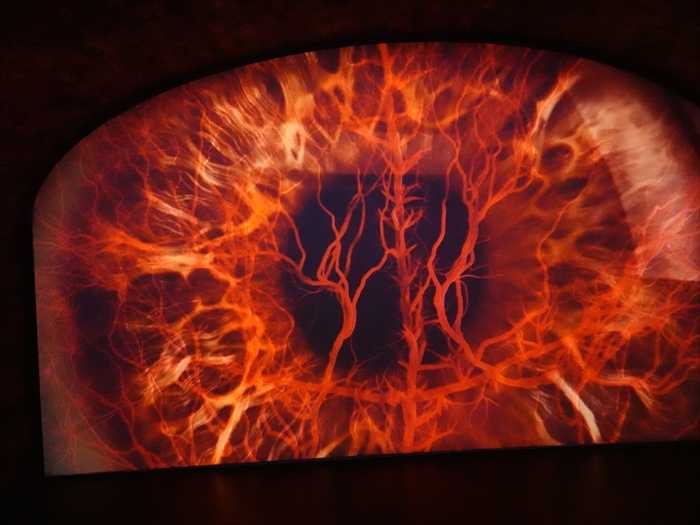
氷の結晶(クリスタル)と雪の結晶(スノーフレーク)をモチーフ にした
映像インスタレーションの一場面。

アイルランド出身の 女性科学者 Dame Kathleen Lonsdale(キャスリーン・ロンズデール女史)
に関する展示の一部。
「First female professor at
【初の女性教授
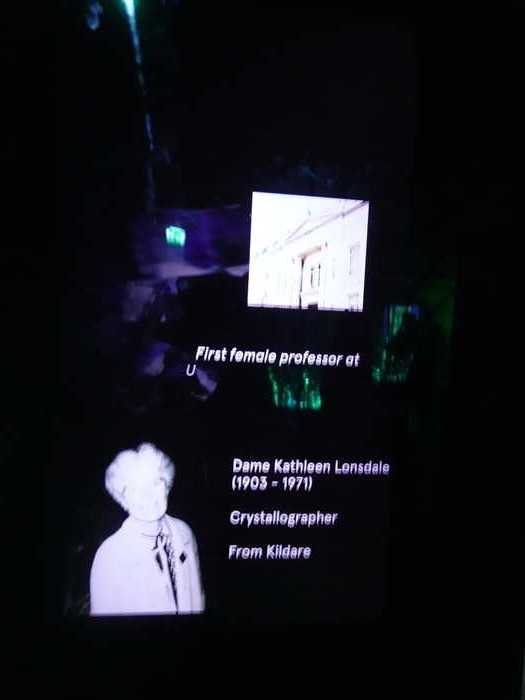
植物の葉の表面を顕微鏡で拡大した映像。
背景には葉脈(veins)が網のように広がり、そこに細長い構造物(おそらく菌糸(hyphae)や
繊維)のようなものが交差していた。
・自然界におけるネットワーク構造の可視化
・生命のつながりや情報伝達の視覚表現
・科学とアートの融合映像展示
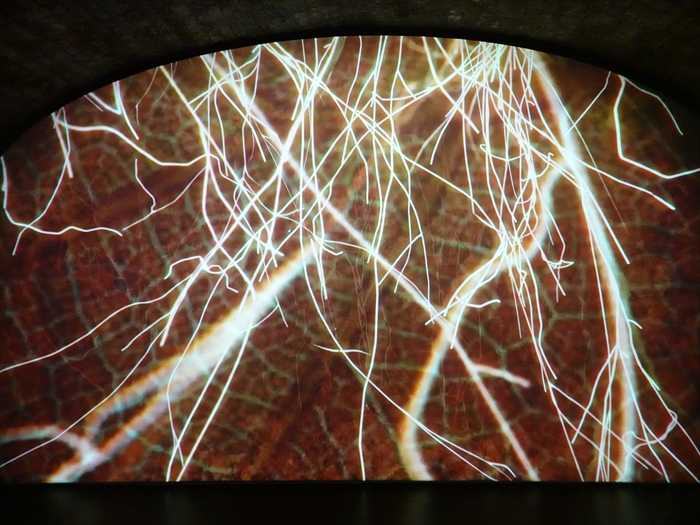
プロテスタントとの対立がさらに激化し、後のクロムウェルのアイルランド征服 へとつながる。

1652年の土地再分配法(Act of Settlement 1652)およびクロムウェルのアイルランド侵攻に
おけるカトリック聖職者の迫害を伝えるもの。
「UNDER THE ACT OF SETTLEMENT 1652 CATHOLIC CLERGY COULD BE EXECUTED IF CAPTURED.
REV. ROBERT BARRY WAS AMONG THE CATHOLIC CLERICS HUNTED DOWN AFTER
OLIVER CROMWELL’S INVASION OF IRELAND.」
OLIVER CROMWELL’S INVASION OF IRELAND.」
【1652年の土地再分配法(Act of Settlement)により、カトリック聖職者は捕らえられた場合、
処刑される可能性がありました。
ロバート・バリー師(Rev. Robert Barry)は、オリバー・クロムウェルのアイルランド侵攻後に処刑される可能性がありました。
追跡されたカトリック聖職者の一人でした。】

イングランド側(特にクロムウェル派や議会派)の視点を再現したナレーションか登場人物の
セリフであり、1641年のアイルランド反乱(Irish Rebellion of 1641)を指していると
考えられる。
「since their murderous rebellion was put down・・・・」
【彼らの殺人的な反乱が鎮圧されて以来。・・・・】

単に「苦難の歴史」としてだけでなく、移民たちが新天地で社会に貢献し、変化に適応して
いった「前向きな側面」も強調。
「After all, emigration is not just a chronicle of sorrow and regret.いった「前向きな側面」も強調。
It is also a powerful story of contribution and adaptation.」
【結局のところ、移民の歴史は悲しみと後悔の記録だけではありません。
それはまた、貢献と適応の力強い物語でもあるのです。】

地下の展示通路の一部であっただろうか?
石造アーチ天井:アーチ型の石造の天井と壁は、19世紀の倉庫(CHQ Building)を再利用した
EPICミュージアムの特徴である と。

1995年にアイルランドの詩人シェイマス・ヒーニー(Seamus Heaney)がノーベル文学賞を
受賞したことを記念したもの。
「1995
Poet Seamus Heaney wins the Nobel Prize in Literature, joining the three previous
Irish Nobel Laureates in literature,
Irish Nobel Laureates in literature,
William Butler Yeats (1923),
George Bernard Shaw (1925), and
Samuel Beckett (1969)」
【1995年
【1995年
詩人 シェイマス・ヒーニー が ノーベル文学賞 を受賞。
これは、アイルランド出身の以下の3人の先人たちに続く快挙である:
・ウィリアム・バトラー・イェイツ(1923年受賞)
・ジョージ・バーナード・ショー(1925年受賞)
・サミュエル・ベケット(1969年受賞)】

アイルランド系移民のスポーツ分野での功績や文化的影響を紹介する一場面 。
「WHAT A PLAY · NOW TAKING THE LEAD · HERE COMES JOHNNY」
【なんというプレーだ! いまリードを奪った! ジョニーが来たぞ!】
「スポーツと移民の功績」セクションの一部であっただろうか?

「 スポーツ展示セクション
」の一角。
上部には格子状のフレームに、スポーツ選手が連続動作する様子を描いたストロボ的な動きの
シルエットが浮かんでいた。
来館者が操作しているのはマルチタッチ式のインタラクティブスクリーンで、アイルランド系
移民が関わったスポーツ分野の功績、人物、映像などを体験的に閲覧できる展示。
シルエットが浮かんでいた。
来館者が操作しているのはマルチタッチ式のインタラクティブスクリーンで、アイルランド系
移民が関わったスポーツ分野の功績、人物、映像などを体験的に閲覧できる展示。

「スポーツと移民」セクションの一部 で、プロジェクション映像とインタラクティブアートが
組み合わさった展示空間。
画面全体は緑と黒のモザイク状のグリッドで覆われており、中央が徐々に透明化
(ピクセルが消えていくように)され、背景にラグビーかゲーリックフットボールの
映像が現れて来たのであった。

アイルランドのスポーツ文化と移民のつながりを象徴するセクション。
左:青いジャージ(Aerolineas Argentinas)
アルゼンチンのアイルランド系ゲーリック・フットボールチーム
ロゴ:「Aerolineas Argentinas(アルゼンチン航空)」とあり、アイルランド系移民が
南米で設立したクラブチーム?
中央:白とオレンジのバスケットボール型ユニフォーム
ゲーリックバスケット(国際的展開の一環)、またはアメリカのアイルランド系クラブの可能性。
右:赤と黄のジャージ(サイン入り)
ベルギーやスペインにあるアイルランド系クラブのチーム?

世界中のアイルランド系移民がゲーリック・アスレチック協会(GAA)のスポーツ を通じて
繋がっていることを示している。
ゲーリック・フットボール 👈️リンクは1チーム15人のプレーヤーによって行われ、長方形の
競技場には両側にH型のゴールがある、アイルランドで最も人気のあるスポーツである。
サッカーとバスケットボールの技術を要するスピーディーなゲームである。
左:黒・緑・赤・白のユニフォーム
国旗モチーフのデザイン(南アフリカ共和国の国旗に類似)
南アフリカにあるGAAクラブ
中央(白黒のユニフォーム)
イギリス国内のアイルランド系クラブ
右(黄・緑・黒のユニフォーム)
アメリカのGAAクラブ

アイルランド系移民が世界各地でゲーリックスポーツを実践 していることを象徴する
ユニフォームやスポーツ用品が並べられていた。

「 GAA Equipment & Memorabilia
・South Africa Gaels GAA jersey
・St Joseph’s Swansea GAA jersey (Wales)
・Pittsburgh GAA jersey (USA) (Signed by Team)
・Manhattan Gaels GAA souvenir pin
・Handball
・North Syracuse GAA souvenir patch
・Poster advertising the now legendary 1947 All-Ireland Gaelic football final
in the New York Polo Grounds
・Gaelic football」 in the New York Polo Grounds
【 GAAの用具と記念品
・南アフリカ・ゲールズのGAAユニフォーム
・セント・ジョセフズ・スウォンジー(ウェールズ)のGAAユニフォーム
・ピッツバーグ(アメリカ)のGAAユニフォーム(チームのサイン入り)
・マンハッタン・ゲールズのGAA記念ピンバッジ
・ハンドボール(ゲーリック・ハンドボール)
・ノース・シラキュース(アメリカ)のGAA記念ワッペン
・現在では伝説とされる1947年の全アイルランド・ゲーリック・フットボール決勝戦
(ニューヨークのポログラウンドで開催)のポスター
(ニューヨークのポログラウンドで開催)のポスター
・ゲーリック・フットボール】
GAA(Gaelic Athletic Association )は アイルランドの伝統スポーツ(ゲーリック・フットボール、
ハーリング、ハンドボールなど)を統括する団体 。
GAA(Gaelic Athletic Association )は アイルランドの伝統スポーツ(ゲーリック・フットボール、
ハーリング、ハンドボールなど)を統括する団体 。

ハーリング(Hurling) 👈️リンク の国際的な広がりを紹介する展示.
左:
「EUROPE(ヨーロッパ)」
ヨーロッパにおいてもアイルランド移民によってハーリングが根付いている
右:
「ARGENTINA(アルゼンチン)「Hurling matches were played weekly until World War I stopped the import of hurleys」
【第一次世界大戦がハーリー(ハーリング用のスティック)の輸入を止めるまで、ハーリングの
試合は毎週行われていた。】
ハーリング(Hurling)は、アイルランド発祥の伝統的な球技で、ゲーリック・アスレチック協会
(GAA)によって支えられている競技。
(GAA)によって支えられている競技。
19世紀末から20世紀初頭にかけて、アイルランド移民が多く渡った国々(例:アルゼンチン、
オランダ、アメリカ)でも普及。
オランダ、アメリカ)でも普及。
アルゼンチンでは第一次世界大戦前まで盛んにプレーされていたが、ハーリー(木製スティック)の
供給が戦争の影響で困難になったため、試合は衰退したという。
供給が戦争の影響で困難になったため、試合は衰退したという。

これも ハーリング(Hurling)展示コーナー の一部。
ユニフォーム姿の男性たちが笑顔で手を振っている、古い時代のチーム集合写真
(おそらく20世紀前半)。

「 Playing the World
The Gaelic Athletic Association (GAA) is a pillar of Irish society, so it is not surprising that
Irish emigrants have brought Gaelic games with them around the world.
Irish emigrants have brought Gaelic games with them around the world.
Today a fifth of the GAA’s clubs are outside Ireland. The majority are in the
United Kingdom, the United States and Australia, but Gaelic games are also thriving
in such unexpected places as Malaysia and Kuwait.
United Kingdom, the United States and Australia, but Gaelic games are also thriving
in such unexpected places as Malaysia and Kuwait.
The global GAA has a long history: Argentina saw Gaelic games flourishing before
World War I cut off access to the supply of Irish ash for making hurleys, the sticks
used to carry and hit the ball in hurling.
Although the games associated with the GAA, primarily hurling and Gaelic football,World War I cut off access to the supply of Irish ash for making hurleys, the sticks
used to carry and hit the ball in hurling.
have historically been played in other countries by Irish-born immigrants, this has
started to change in recent years. Players and even whole teams with little or
no Irish connection are playing outside Ireland, as Gaelic games prove their worth
even without the cultural history.」
【 世界でプレイされるゲーリック・ゲーム
ゲーリック・アスレチック協会(GAA)はアイルランド社会の柱であり、アイルランド系移民
たちが世界中にゲーリック・ゲームを広めたのは当然のことです。
たちが世界中にゲーリック・ゲームを広めたのは当然のことです。
現在、GAAクラブの5分の1がアイルランド国外に存在しています。大半はイギリス、アメリカ
合衆国、オーストラリアにありますが、マレーシアやクウェートといった意外な場所でも
ゲーリック・ゲームは盛んに行われています。
合衆国、オーストラリアにありますが、マレーシアやクウェートといった意外な場所でも
ゲーリック・ゲームは盛んに行われています。
国際的なGAAの歴史は長く、たとえばアルゼンチンでは第一次世界大戦以前にゲーリック・
ゲームが盛んでしたが、その戦争がハーリング用のスティック(ハーリー)を作るための
アイルランド産トネリコの輸出を断ち切ってしまいました。
GAAに関連する競技、主にハーリングとゲーリック・フットボールは、長らくアイルランドゲームが盛んでしたが、その戦争がハーリング用のスティック(ハーリー)を作るための
アイルランド産トネリコの輸出を断ち切ってしまいました。
生まれの移民によって他国でも行われてきましたが、近年では状況が変わりつつあります。
アイルランドにほとんど、あるいはまったく縁のない選手やチームがアイルランド国外で競技に
参加しており、文化的な背景がなくてもゲーリック・ゲームの価値が証明されているのです。】

ゲーリック・ゲームの世界的な広がりを象徴するインスタレーション作品 。
中心から外へ放射状に広がる光ファイバー状の構造体
→ ゲーリック・ゲーム(特にハーリングやゲーリック・フットボール)の精神と文化が、
アイルランドから世界中に拡がっていったことを象徴しています。
アイルランドから世界中に拡がっていったことを象徴しています。
青や緑に光るライティング
→ アイルランドの伝統色(緑)とスポーツのエネルギー(青)を表現。

人間の眼球の虹彩と血管網を強調した映像表現か?
「アイルランド文化のグローバル展開」を示す展示で使用されている映像演出であろう。
・アイデンティティの核心(目)を通じて、ゲーリック文化を見る/見られる
・視神経のような「つながり」を世界中に張り巡らせるアイルランド人の精神
・目を通じた「体験」=見ることによる共感や文化的継承

氷の結晶(クリスタル)と雪の結晶(スノーフレーク)をモチーフ にした
映像インスタレーションの一場面。
アイデンティティの多様性と個性
・雪の結晶は「二つとして同じものが存在しない」とされる
・→ アイルランド系ディアスポラ(移民)の多様な存在を象徴
冷たい地で育つ「文化の核」
・氷の結晶=厳しい環境(国外)で結晶化したアイルランド文化
・海外に根を張るゲーリック精神や文化の「純度・硬度」
ネットワーク的な連なり
・結晶構造は、前のネットワーク構造と連続性がある
・= 世界中に広がるアイルランド系住民とその文化的絆

アイルランド出身の 女性科学者 Dame Kathleen Lonsdale(キャスリーン・ロンズデール女史)
に関する展示の一部。
「First female professor at
U...
Dame Kathleen Lonsdale
(1903 – 1971)
Crystallographer
From Kildare」 【初の女性教授
初の女性教授
(おそらく University College London)
キャスリーン・ロンズデール女史
(1903年 – 1971年)
結晶学者
キルデア出身(アイルランド)
キャスリーン・ロンズデール女史
(1903年 – 1971年)
結晶学者
キルデア出身(アイルランド)】
植物の葉の表面を顕微鏡で拡大した映像。
背景には葉脈(veins)が網のように広がり、そこに細長い構造物(おそらく菌糸(hyphae)や
繊維)のようなものが交差していた。
・自然界におけるネットワーク構造の可視化
・生命のつながりや情報伝達の視覚表現
・科学とアートの融合映像展示

ベンゼン(benzene)および六塩化ベンゼン(hexachlorobenzene)の構造解明
に関する展示。
「Discovered the structure of benzene and hexachlorobenzene」
【ベンゼンおよび六塩化ベンゼンの構造を解明した】
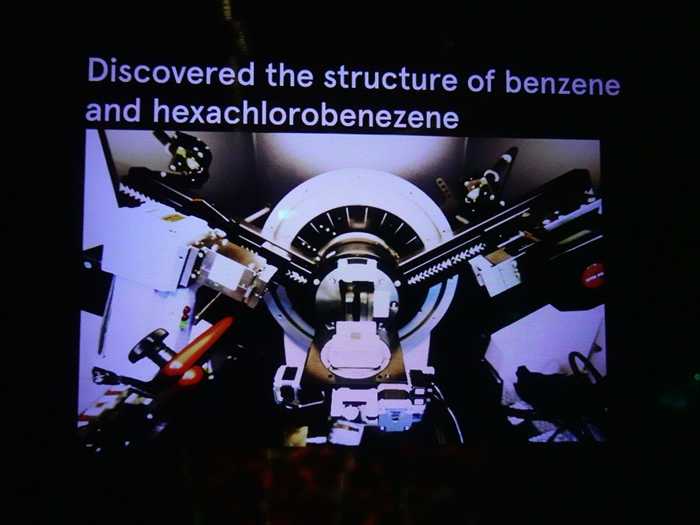
タンポポ(dandelion)の変化を映像で表現している場面。
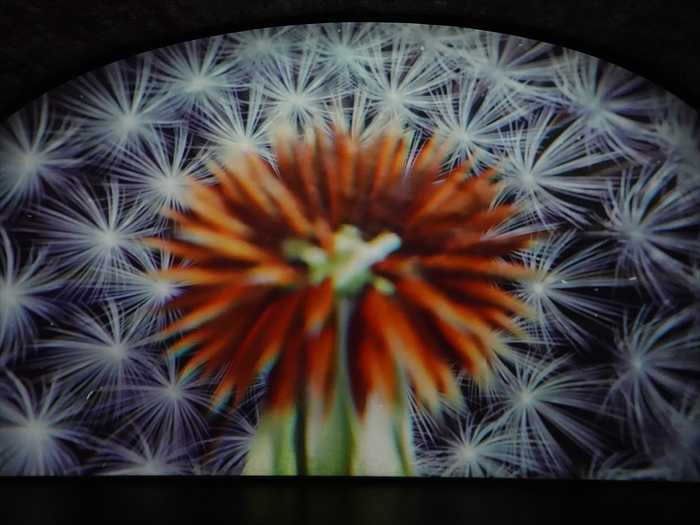
ロバート・ボイル(Robert Boyle, 1627–1691) について紹介。
「Robert Boyle (1627–1691)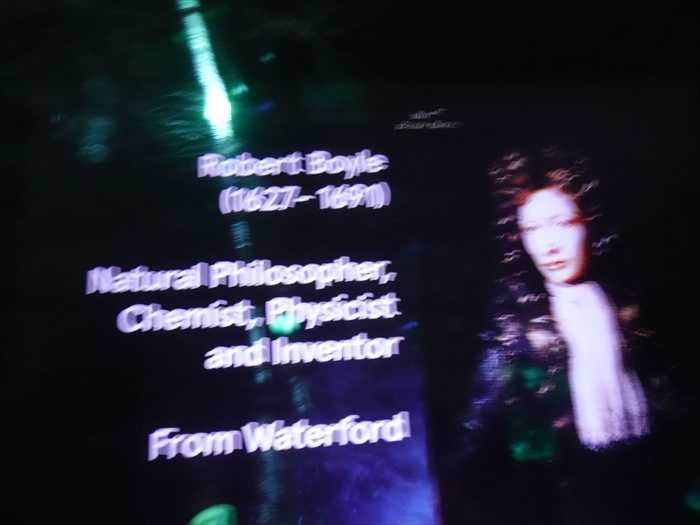
ロバート・ボイルの法則(Boyle's Law)について説明。
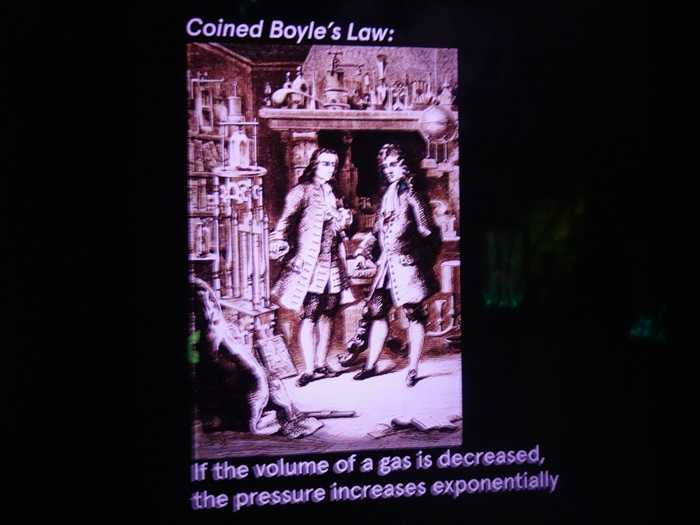
アイルランドの天文学者ローズ・オハロラン(Rose O’Halloran) についての紹介。
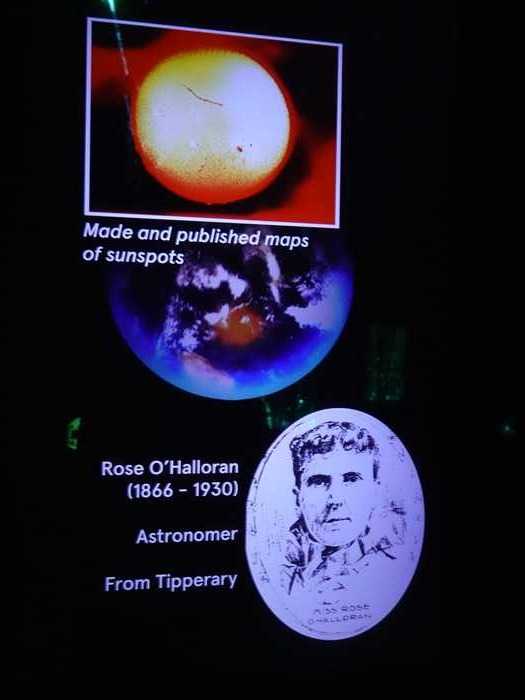
地球を宇宙空間から見た映像の一部で、ほぼ半分が暗闇に覆われた状態
(昼夜の境界「ターミネーター」)で表現されていた。
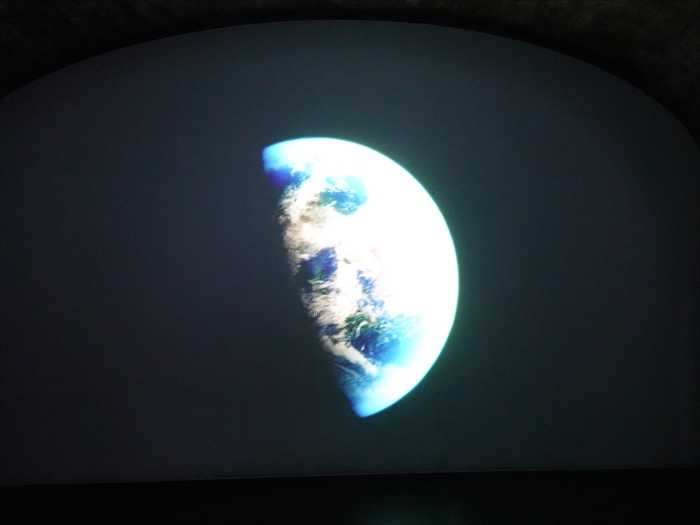
太陽の表面を描いた映像。
太陽のダイナミックなエネルギー活動や、核融合による膨大なエネルギー放出を視覚的に示して
いるのであった。
黒点(sunspots)の地図を作成・公表したことで知られているRose O'Halloran(1866–1930)
の業績を視覚的に示しているのであろう。
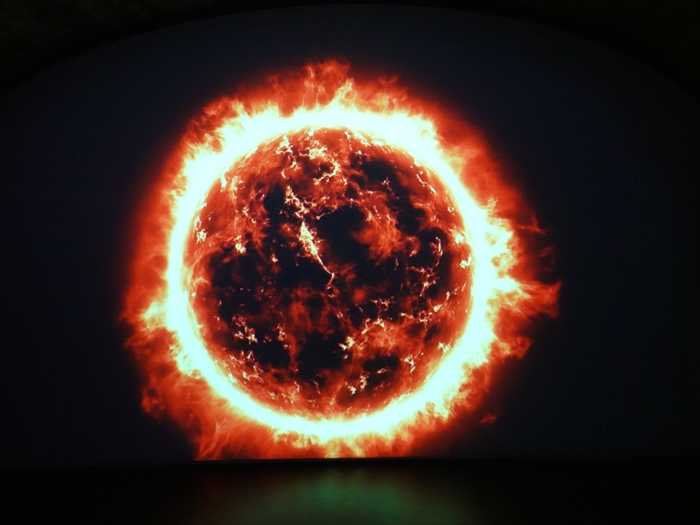
「Made a year-long sky survey in Auckland, New Zealand
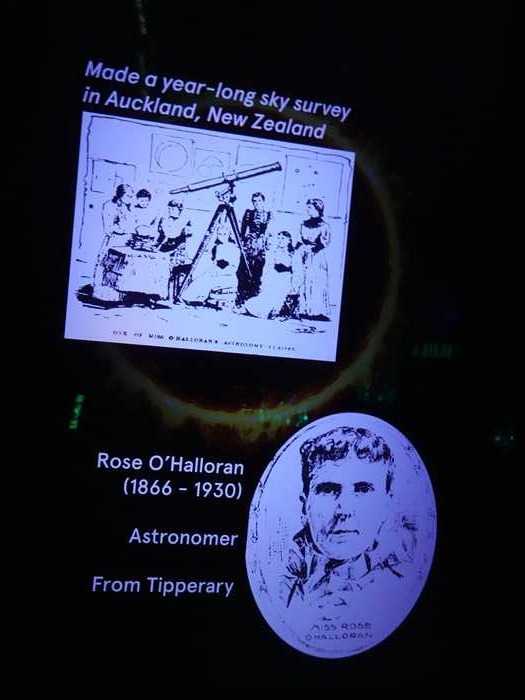
・・・ もどる ・・・

タンポポ(dandelion)の変化を映像で表現している場面。
中央には、まだ開いている途中のオレンジ色の花(タンポポの花)が。
背景には、タンポポの綿毛(種子と冠毛:pappus)が精細に広がっている。
「生命の構造」や「自然界のパターン」「拡大されたミクロの世界」などをテーマに 。
「生命の構造」や「自然界のパターン」「拡大されたミクロの世界」などをテーマに 。

ロバート・ボイル(Robert Boyle, 1627–1691) について紹介。
「Robert Boyle (1627–1691)
Natural Philosopher,
Chemist, Physicist,
and Inventor
From Waterford」
【 ロバート・ボイル(1627年〜1691年)
自然哲学者、
化学者、物理学者、
そして発明家
ウォーターフォード出身】
ロバート・ボイルはアイルランド出身の著名な科学者で、「近代化学の父」と称される人物。
特に有名なのは:
特に有名なのは:
・ ボイルの法則(Boyle’s Law):気体の体積と圧力の関係を表す法則
(温度一定のもとで、気体の圧力と 体積は反比例する)
(温度一定のもとで、気体の圧力と 体積は反比例する)
・実験に基づいた自然科学の方法論を重視し、錬金術から近代化学への移行を象徴する存在
・科学革命期の王立協会(Royal Society)の創設メンバーの1人

ロバート・ボイルの法則(Boyle's Law)について説明。
「Coined Boyle's Law:
If the volume of a gas is decreased,
the pressure increases exponentially」
【ボイルの法則を定式化:
気体の体積が減少すると、
圧力は指数関数的に増加する】

アイルランドの天文学者ローズ・オハロラン(Rose O’Halloran) についての紹介。
「・Made and published maps of sunspots
・Rose O’Halloran (1866–1930)
・Astronomer
・From Tipperary」
【・黒点の地図を作成し、出版した ・ローズ・オハロラン(1866年〜1930年)
・天文学者
・ティペラリー出身】
地球を宇宙空間から見た映像の一部で、ほぼ半分が暗闇に覆われた状態
(昼夜の境界「ターミネーター」)で表現されていた。
・地球の生命圏の脆弱性と美しさ
・科学者たちの業績がどのように地球観・宇宙観に寄与したか
・人類が理解し始めた「地球という存在」の全体像
・マクロ視点(宇宙)とミクロ視点(結晶、細胞、原子)のつながり を
表しているのであろう。
表しているのであろう。

太陽の表面を描いた映像。
太陽のダイナミックなエネルギー活動や、核融合による膨大なエネルギー放出を視覚的に示して
いるのであった。
黒点(sunspots)の地図を作成・公表したことで知られているRose O'Halloran(1866–1930)
の業績を視覚的に示しているのであろう。

「Made a year-long sky survey in Auckland, New Zealand
Rose O'Halloran
(1866 – 1930)
Astronomer
From Tipperary」
【ニュージーランド・オークランドにて
1年間にわたる天体観測調査を実施
ローズ・オハローラン
(1866年 – 1930年)
天文学者
ティペラリー出身】 
・・・ もどる ・・・
お気に入りの記事を「いいね!」で応援しよう
Re:アイルランド・ロンドンへの旅(その66):Dublin市内散策(5/)・EPIC The Irish Emigration Museum(EPIC アイルランド移民博物館)-2(09/02)
私はイスラム教徒です さん
神神は言った: コーランで
『 人びとよ。あなたがた、またあなたがた以前の者を創られた主に仕えなさい。恐らくあなたがたは(悪魔に対し)その身を守るであろう。」(聖クルアーン 2:21)
(かれは)あなたがたのために大地を臥所とし、また大空を天蓋とされ、天から雨を降らせ、あなたがたのために糧として種々の果実を実らせられる方である。だからあなたがたは(真理を)知った上は、(唯一なる)アッラーの外に同じような神があるなどと唱えてはならない。」(聖クルアーン 2:22)
もしあなたがたが、わがしもべ(ムハンマド)に下した啓示を疑うならば、それに類する1章〔スーラ〕でも作ってみなさい。もしあなたがたが正しければ、アッラー以外のあなたがたの証人を呼んでみなさい。」(聖クルアーン 2:23)
もしあなたがたが出来ないならば、いや、出来るはずもないのだが、それならば、人間と石を燃料とする地獄の業火を恐れなさい。それは不信心者のために用意されている。」(聖クルアーン 2:24)
信仰して善行に勤しむ者たちには、かれらのために、川が下を流れる楽園に就いての吉報を伝えなさい。かれらはそこで、糧の果実を与えられる度に、「これはわたしたちが以前に与えられた物だ。」と言う。かれらには、それ程似たものが授けられる。また純潔な配偶者を授けられ、永遠にその中に住むのである。」(聖クルアーン 2:25)』
こんにちは
私はイスラム教徒です。 イスラム教について学ぶよう人々を招待します。
私のブログを見てください イスラム教についての写真やビデオで説明しています
https://justpaste.it/as0rx
幸せな人生をお祈りします……ありがとう
(2025.09.02 16:36:44)
『 人びとよ。あなたがた、またあなたがた以前の者を創られた主に仕えなさい。恐らくあなたがたは(悪魔に対し)その身を守るであろう。」(聖クルアーン 2:21)
(かれは)あなたがたのために大地を臥所とし、また大空を天蓋とされ、天から雨を降らせ、あなたがたのために糧として種々の果実を実らせられる方である。だからあなたがたは(真理を)知った上は、(唯一なる)アッラーの外に同じような神があるなどと唱えてはならない。」(聖クルアーン 2:22)
もしあなたがたが、わがしもべ(ムハンマド)に下した啓示を疑うならば、それに類する1章〔スーラ〕でも作ってみなさい。もしあなたがたが正しければ、アッラー以外のあなたがたの証人を呼んでみなさい。」(聖クルアーン 2:23)
もしあなたがたが出来ないならば、いや、出来るはずもないのだが、それならば、人間と石を燃料とする地獄の業火を恐れなさい。それは不信心者のために用意されている。」(聖クルアーン 2:24)
信仰して善行に勤しむ者たちには、かれらのために、川が下を流れる楽園に就いての吉報を伝えなさい。かれらはそこで、糧の果実を与えられる度に、「これはわたしたちが以前に与えられた物だ。」と言う。かれらには、それ程似たものが授けられる。また純潔な配偶者を授けられ、永遠にその中に住むのである。」(聖クルアーン 2:25)』
こんにちは
私はイスラム教徒です。 イスラム教について学ぶよう人々を招待します。
私のブログを見てください イスラム教についての写真やビデオで説明しています
https://justpaste.it/as0rx
幸せな人生をお祈りします……ありがとう
(2025.09.02 16:36:44)
【毎日開催】
15記事にいいね!で1ポイント
10秒滞在
いいね!
--
/
--
© Rakuten Group, Inc.










